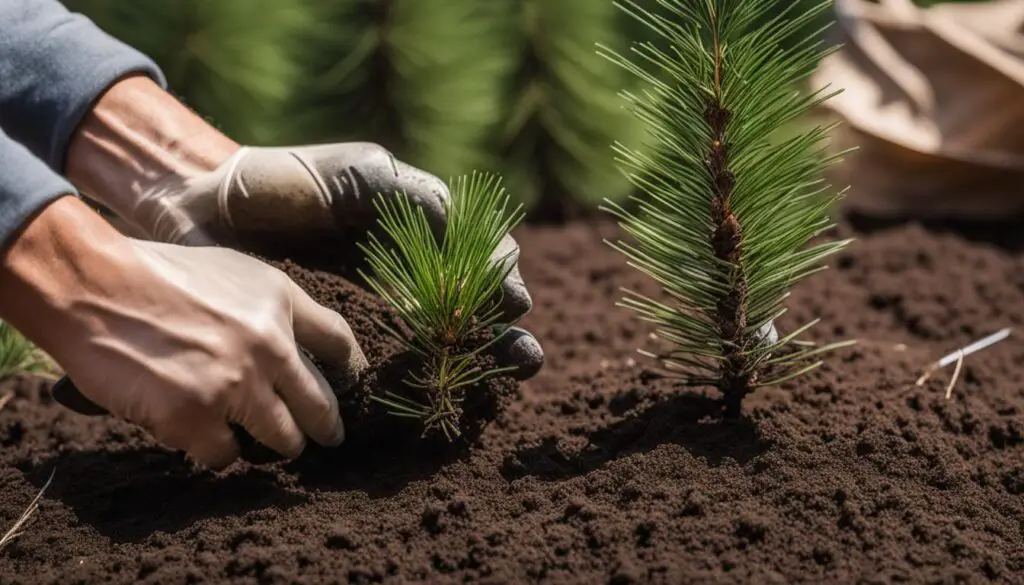Pine trees are a beloved addition to landscapes, with their distinctive shape and evergreen foliage. But do pine trees need fertilizer to thrive? In this article, we will explore the fertilizer requirements for pine trees and provide tips for ensuring their optimal care.
While pine trees are generally hardy and can obtain some nutrients from the soil, there are situations where fertilizer may be necessary. Signs that your pine tree may need fertilizer include sparse or slow new growth, unhealthy needle color, or shorter than normal needles. Additionally, newly transplanted pine trees may experience slow growth until they are re-established.
However, it’s important to note that pine trees generally require less fertility than deciduous trees. Evergreens, including pine trees, have adapted to survive in nutrient-poor soils. Nonetheless, there are instances where fertilization can benefit their overall health and growth.
Key Takeaways:
- Pine trees may require fertilizer in certain cases, such as slow growth or nutrient deficiencies.
- Signs that your pine tree may need fertilizer include sparse or slow new growth, unhealthy needle color, or shorter than normal needles.
- Newly transplanted pine trees may exhibit slow growth until they are re-established.
- Pine trees generally require less fertility than deciduous trees.
- Applying fertilizer to the lawn can also benefit evergreens in the landscape.
When to Fertilize Pine Trees
The best time to fertilize pine trees is in early spring, just before new growth begins. Fertilizing at this time aids in the expansion of fresh shoot tips and helps protect new growth from harsh winter weather.
It is important not to apply fertilizer later than mid-July, as this can stimulate late-season growth that may not have time to harden off before winter, increasing the risk of winter injury and dieback.
“The best time to fertilize pine trees is in early spring, just before new growth begins.”
If a pine tree is nutrient-stressed, a slow-release fertilizer can be applied in late summer to late fall to help the tree tolerate winter and emerge healthier in the spring.
How to Fertilize Pine Trees
Properly fertilizing pine trees is essential for their growth and overall health. By following these pine tree fertilizing tips, you can ensure that your trees receive the nutrients they need to thrive.
1. Conduct a Soil Test
Before fertilizing your pine trees, it is important to conduct a soil test to determine if there are any nutrient deficiencies. A soil test will provide valuable insights into the pH levels and nutrient composition of the soil, allowing you to make informed decisions about fertilizer application.
2. Deeply Water Before Fertilizing
Deeply watering your pine trees before applying fertilizer is crucial, especially if the soil is dry. This helps prevent fertilizer burn and ensures that the trees can effectively absorb the nutrients. Make sure the soil is adequately moist but not waterlogged.
3. Apply Fertilizer Around the Drip Line
When fertilizing pine trees, it is best to apply the fertilizer around the drip line—the area where the tree’s branches extend. Following the instructions on the fertilizer label, evenly distribute the fertilizer along the drip line to ensure that the roots receive an ample supply of nutrients.
4. Consider pH Adjustments
Pine trees generally prefer slightly acidic to neutral soils. Based on the results of your soil test, you may need to make pH adjustments to create the optimal growing conditions for your trees. Adding soil amendments or using specific fertilizers designed for adjusting pH levels can help create the right balance.
5. Choose the Right Fertilizer
The best option for fertilizing pine trees is a granular, slow-release fertilizer specifically formulated for evergreens. These fertilizers provide a steady supply of nutrients over an extended period, promoting healthier growth and reducing the risk of nutrient burn. Look for fertilizers with an appropriate NPK ratio for pine trees.
6. Safety Precautions
When handling chemical fertilizers, it is essential to prioritize safety. Wear protective gloves and a face mask to avoid direct contact and inhalation of potentially harmful substances. Additionally, carefully read and follow all instructions and storage guidelines provided on the fertilizer label.
By following these fertilizing tips, you can ensure that your pine trees receive the necessary nutrients to thrive and enhance the beauty of your landscape.

| Fertilizer | Features |
|---|---|
| Espoma Evergreen-Tone 4-3-4 | Provides slow-release nutrients |
| Jobe’s Organics Evergreen Fertilizer Spikes | Easy-to-use spikes for deep root feeding |
| Scotts Evergreen Fertilizer | Helps improve root development |
| Monterey Pine & Evergreen Fertilizer | Enhances overall tree health |
Best Fertilizer for Pine Trees
When it comes to fertilizing pine trees, choosing the right fertilizer can make a significant difference in their overall health and growth.
A granular, slow-release fertilizer is highly recommended for pine trees. These formulations are specifically designed for evergreens, providing a balanced supply of nutrients over an extended period of time.
One example of an excellent organic granular fertilizer for pine trees is Espoma Evergreen-Tone 4-3-4. This fertilizer not only supplies essential nutrients but also introduces beneficial soil microbes that enhance the tree’s root development and nutrient uptake.
For a more customized approach, nutrient testing can be performed to identify any specific deficiencies in the soil. This allows for targeted amendments to be made, ensuring the pine trees receive the precise nutrients they require.
| Fertilizer | Analysis | Benefits |
|---|---|---|
| Espoma Evergreen-Tone 4-3-4 | NPK: 4-3-4 | – Slow-release formula – Organic and environmentally friendly – Promotes healthy root development – Enhances nutrient uptake – Provides beneficial soil microbes |
As with any fertilizer, it’s essential to follow the instructions on the packaging carefully. Applying the fertilizer around the drip line of the tree and watering deeply after application will help ensure optimal absorption.
Remember to wear protective gloves and a face mask when handling chemical fertilizers and store them in a safe place away from children and pets.
By choosing the best fertilizer for pine trees and providing them with the necessary nutrients, you can promote their overall growth and well-being, resulting in healthy and vibrant trees in your landscape.
Tips for Fertilizing Pine Trees and Pine Tree Care
When it comes to fertilizing pine trees and ensuring their proper care, there are a few key tips to keep in mind. By following these guidelines, you can help your pine trees thrive and maintain their health for years to come.
1. Take a Soil Test
Before making any amendments to the soil, it’s important to conduct a soil test to determine the specific needs of your pine tree. This will help you identify any nutrient deficiencies and ensure that you provide the right fertilizer.
2. Fertilize in Early Spring
Fertilizing should be done once per year in early spring, just before new growth begins. Make sure the soil is moist before applying the fertilizer. This timing helps provide essential nutrients to support the expansion of fresh shoot tips and protect new growth from harsh winter weather.
3. Use Slow-Release, Granular Fertilizers
Slow-release, granular fertilizers that are specifically designed for evergreens work best for pine trees. These fertilizers provide a steady supply of nutrients over time, ensuring that your pine trees receive the necessary nourishment to thrive.
4. Apply Mulch
Applying mulch around the base of the pine tree is essential for maintaining moisture levels in the soil. It also helps to suppress weed growth and adds organic material to the soil as it breaks down. However, it’s important to avoid using plastic sheeting under the mulch, as it can prevent water from reaching the tree roots.
5. Regular Watering and Proper Irrigation
In addition to fertilizing and mulching, regular watering and proper irrigation are crucial for the overall health and care of pine trees. Ensure that your pine trees receive adequate water, especially during dry periods, to keep the soil moist and the trees hydrated.
By following these tips for fertilizing pine trees and providing proper care, you can support the growth and well-being of your pine trees, creating a beautiful and thriving landscape.

| Key Tips for Fertilizing Pine Trees and Pine Tree Care |
|---|
| Take a soil test to determine specific nutrient needs |
| Fertilize in early spring before new growth begins |
| Use slow-release, granular fertilizers designed for evergreens |
| Apply mulch around the base of the tree |
| Regularly water and ensure proper irrigation |
Conclusion
In conclusion, pine trees may require fertilizer under certain circumstances to address nutrient deficiencies, promote growth, or recover from damage caused by pests or diseases. Conducting a soil test is crucial in determining the specific nutrient requirements of pine trees before applying fertilizer. Early spring is the best time to fertilize pine trees, using a granular, slow-release fertilizer specially formulated for evergreens. Additionally, proper care practices such as regular watering, mulching, and appropriate irrigation are essential for maintaining the overall health and well-being of pine trees.
By providing the necessary nutrients and following proper care techniques, pine trees can thrive and contribute to a beautiful landscape. Remember to prioritize the health of your pine trees by investing in their fertilizer requirements and implementing effective fertilizing strategies.
FAQ
Do pine trees need fertilizer?
Pine trees may require fertilizer at some point to optimize their health and growth. Signs that fertilizer is needed include sparse or slow new growth, unhealthy needle color, or shorter than normal needles.
When is the best time to fertilize pine trees?
The best time to fertilize pine trees is in early spring, just before new growth begins. Fertilizing at this time aids in the expansion of fresh shoot tips and helps protect new growth from harsh winter weather.
How do I fertilize pine trees?
Before fertilizing pine trees, conduct a soil test to determine if there is a nutrient deficiency. Deeply water the pine trees before applying fertilizer, especially if the soil is dry, to prevent burn. Fertilizer should be applied around the drip line of the tree, following the label instructions.
What is the best fertilizer for pine trees?
The best option for fertilizing pine trees is a granular, slow-release fertilizer designed for evergreens. One example is Espoma Evergreen-Tone 4-3-4, which provides a well-balanced supply of nutrients and beneficial soil microbes.
What are some tips for fertilizing pine trees and pine tree care?
It is recommended to apply mulch around the base of the tree to maintain moisture levels in the soil and add organic material as it breaks down. Regular watering and proper irrigation are also crucial for the overall health and care of pine trees.
What are the requirements for pine tree fertilizer?
Pine trees generally prefer slightly acidic to neutral soils. Before making any amendments, take a soil test to determine the specific needs of the pine tree. Fertilizing should be done once per year in early spring, ensuring that the soil is moist before applying fertilizer.

